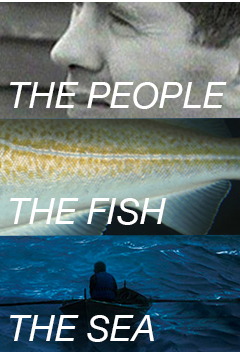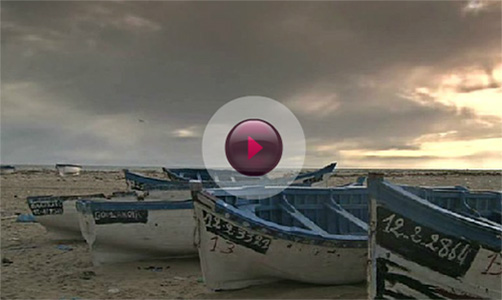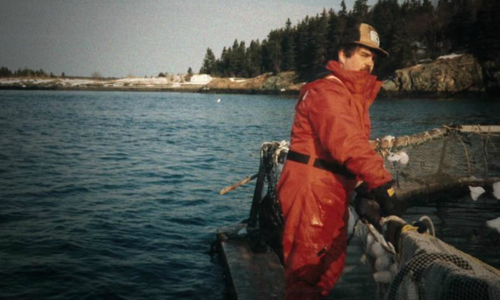A wordless, wrenching musical obituary for the once mighty Newfoundland cod fishery..
More
Gallery: What Happens to the Fish When?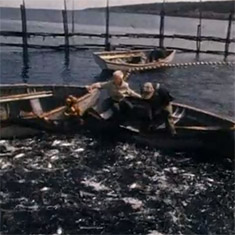
Memory Waltz
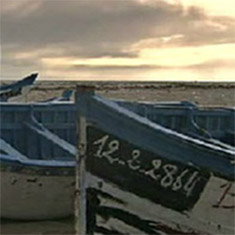
The Damned of the Sea
Ever wonder what happened to those draggers that helped fish out Canada's stocks? 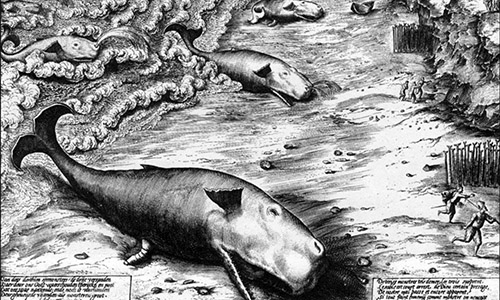
Just Another Fish Story
Ten years ago, the people of Lubec, Maine, were met with an unpleasant surprise... 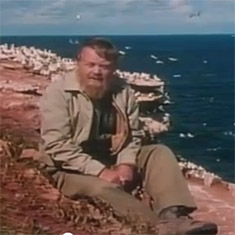
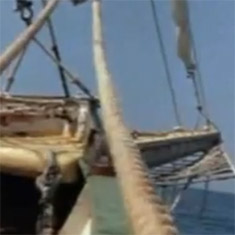
Cod fishing, NFLD - Portugal
Cod built a four-century-long friendship between Portugal and Newfoundland. 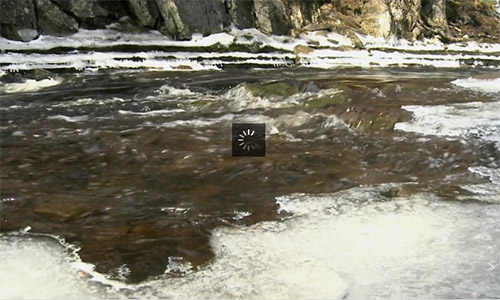
Salmon Wars
The story of New Brunswick and Nova Scotia community opposition to net cage salmon aquaculture in their waters...
The collapse of the once-gigantic North Atlantic cod stock twenty years ago should have been a wakeup call for fishery management throughout the world. It wasn't.
Fishing practices worldwide have changed little. It is startling to watch some of the images in this gallery, to hear some of the voices, and to realise that many of the same practices that destroyed Newfoundland's cod fishery are still being employed around the globe. The placement of this gallery – between the other two – may be appropriate. Fish, after all, are intermediaries: a transit between humans and oceans, and perhaps our most accessible key to comprehending the watery environment which covers 70 percent of the earth's surface. Memory Waltz
Watching this wordless, wrenching musical obituary for the once mighty Newfoundland cod fishery two decades after it was made seems merely poignant...
... until you realise that these images are now completely unfamiliar to a whole generation of Newfoundlanders. Then it hits you: the time when Newfoundland and cod were synonymous is like ancient history today; seeing fish coming up in a cod trap or a hearing a make-and-break engine heading out into the dawn is like imagining the last days of Pompei. Fish were us, and we them, for five centuries. Without them, a hole has opened in our culture, dirged by every foghorn that Ottawa has not yet decommissioned. How many today know how to haul a trap, cut out tongues, scull a punt? Does it matter? The Damned of the Sea
Ever wonder what happened to those draggers that helped fish out the stocks off the coast of Canada and other developed nations?
They moved on to fish out the less developed, less protected - in this case, Morocco. The triumph of this film is not only the remarkable trust and intimacy which the filmmaker establishes with his subjects, but the room he provides for the viewer to walk into the program, and to ponder it. We enter a coastal world where marooned fishermen can't afford fish to eat, while they watch foreign industrial trawlers on the horizon nightly vacuuming up 4000 tonnes of the very fish they are forbidden to catch. The juxtaposition of subsistence fishers' poverty with high-tech industrial dragging is stark. The sheer amount of fish coming over the trawler's side seems shocking by comparison, as does the trawler captain's scorn for marine environmental protection in his home country. This is a beautifully paced film with great heart, but also with disturbing questions. As the trawler captain asserts: if the fish is there, why not take the quota in the most efficient manner? The strong juxtapositions in this feature will evoke a deja vu for Newfoundland viewers. How can it be that local fishers are kept under moratorium, while foreign draggers are not? Morocco has a 200 mile limit, and a history of recent clashes with EU quotas. Why has the government sold quotas to a multinational company while forcibly idling local inshore fishers? What effect is the bottom trawling having on Moroccan marine habitat? And why is this still happening two decades after the Northern Cod catastrophe red-flagged these issues? Related:The Dry Sea: How Developed Countries are Destroying Third World Fisheries(2004) Produced by Marie Wadden, video, 10 minutesDescription:After they helped fish out the Newfoundland cod stocks, the same trawlers were sent to Africa to catch fish that should have been available to local people who need the protein more than we do. Click to watch.Just Another Fish Story 
Ten years ago, the people of Lubec, Maine, were met with an unpleasant surprise: an enormous finback whale had washed onto the beachfront of their tiny coastal town.
Their many voices remind you of the Blind Men and the Elephant as they come to terms with the giant mammal and figure out what to do about it. This entertaining piece of ear candy tells us quite a lot about the people of Lubec, but probably leaves you wondering what caused the whale to beach in the first place. Cetacean beaching is distressingly more and more common worldwide. Possibly this whale blundered into a fishing net by mistake, and lacked a saviour like the late whale rescuer Jon Lien, who saved over 500 whales off Newfoundland's coasts, or similar rescue operations in California. More worrisome is the possibility that the Lubec whale became disoriented by humans' underwater seismic activity. Navy sonar exercises and offshore oil and gas exploration using seismic blasting can seriously affect cetacean hearing. Although seismic blasting is widely practised in our oceans, it's hard to find many online audio or video features about it – is this because no one is making documentaries about the issue, or because industry restricts filmcrews from their rigs? Related:Sea of Slaughter
We all want to change the world.
Farley Mowat certainly did in 1989, with this film based on his book of the same name. His outraged cry about the history of over-exploitation of the Western Atlantic is enough to make you an overnight vegetarian. Strong arguments, with lots of blood on the ice and water, this is Mowat's curse upon the excesses which humanity has visited upon marine life. Unfortunately, his film didn't sway Ottawa's fishery policy and 3 years after it was made, Newfoundland's cod stocks disappeared. The film is passionate, and certainly capitalises on emotionally loaded money shots, but 40 years later does it seem a little pornographic, a j'accuse with a whiff of marine-resource-snuff-film? And so what - why shouldn't filmmakers try to shock and awe their viewers? How else to change things? But does it leave still us the question: what shall we eat for dinner (besides carrots)? Related:Land & Sea: Eco-Fishing(1996) CBC TelevisionDescription:One answer to the dinner question could be sustainable fishery alternatives. In this example, fishermen and consumers in Digby Neck, Nova Scotia are modeling a community-supported fishery: Off the Hook. It's a fishers' cooperative using more sustainable traditional ways of harvesting – hook & line fishing. Customers pay premium prices in advance for fresh fish caught in an eco-friendly way. Is this the fishery of the future? Are small scale, near-shore operations that serve local markets a practical model for feeding humanity in the 21st century? Click to watch.Cod fishing, Pesca do Bacalhau, Newfoundland-Portugal
The last of the Portuguese "White Fleet" – the sailing ship Creola – when this film was made still hook-and-line fishing the Grand Banks of Newfoundland from small dories rowed by hand: a cod-fishing method largely unchanged over centuries.
Cod built a four-century-long friendship between Portugal and Newfoundland. This began to change after Newfoundland's confederation with Canada, and when Portugal later joined the European Union, routing official relations via Ottawa and Brussels. Overfishing by EU draggers soured relations, and by the late 1980s Portuguese vessels were banned from Canadian ports, thus ending the long Portugal-Newfoundland relationship. Prior to Newfoundland's 1949 confederation with Canada, cod landings had been sustainable at around 250,000 tonnes. At the time this film was made in 1966, Ottawa had granted Newfoundland only a 12 mile offshore fishing limit. A heavy foreign fishery depleted the resource, and the cod biomass continued to decline until 1977. At that point, Ottawa extended the limit to 200 miles, and the domestic offshore sector prepared for a bonanza. Canadian draggers entered the fray in a big way, many ice-reinforced to permit fishing in ice-infested northern waters for spawning cod. Landings increased through 1985 but inshore catch declined as offshore landings rose. (Harris Centre report, 2007) It may be tempting to watch this film and romanticise about the days when cod were plentiful and everything was golden off our coasts. In fact, handlining from banker sailing vessels like this was "industrial" fishing in the old way, and over centuries certainly took lots of cod out of the water. From an ecological perspective, was it preferable modern high-tech fish hunting, or was it just less efficient? Salmon Wars: Wild Fish, Aquaculture and the Future of Communities
The story of New Brunswick and Nova Scotia community opposition to net cage salmon aquaculture in their waters...
... and their protest against the social, economic and environmental impacts. The target of their protest is the iindustry giant Cooke Aquaculture, whose video we're also featuring here. The Cooke Aquaculture Story
Here's Cooke's perspective on their industry in Atlantic Canada, plus their subsidiaries in Chile and Spain as well.
How does this colour your response to Salmon Wars? What does the juxtaposition say about point-of-view documentaries, and the power of persuasion? How much is it a matter of production budgets, and how much a matter of sincerity? Whose point of view can you trust? Which feature wears the white hat, which one the black? Do either of them change the opinion you already had before you watched them? Related:How I fell in love with a fishVideo TED talk, 20 mins. Dan Barber, USA.Description:And now for something completely different... but not really: a chef's perspective about sustainable fish farming. Environmentally-concerned chefs face a dilemma about what kind of fish to put on the menu. This one chronicles his pursuit of a sustainable fish he can love, and the foodie honeymoon he's enjoyed since discovering an aquacultured fish from Spain. The fish farm is not Cooke Aquaculture's Spanish subsidiary. Click to watch.SalmoneraVideo, 21 min, 2004, USA. Director: Brent McDonald. Produced by UC Berkeley Graduate School of Journalism.Description:A critique of salmon farming in Chile, and its impact upon the environment, fishermen and the consumer. Click to watch.Related links: |
